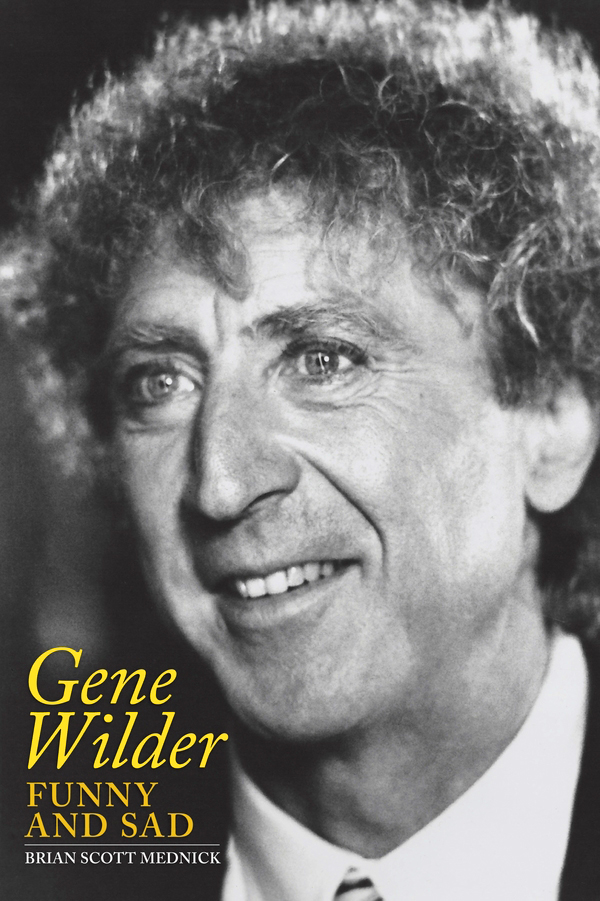
People have different ways of coping with difficult times. For some, communing with nature brings peace. Others find comfort in the care of a mental health professional. For Brian Scott Mednick, an introspective young man coming of age in Manhattan, solace was found inside dark movie theaters, basking in the glow of the latest Gene Wilder film.
Now a resident of Manorville, and the author of the unauthorized biography, “Gene Wilder: Funny & Sad,” Mr. Mednick confessed during a recent interview that at times when he would watch his idol on film, the actor’s portrayal of someone shy or a little awkward and vulnerable resonated deeply.
“I sort of saw myself in his acting at times,” said Mr. Mednick, who, like Wilder, is Jewish. “I understood what he was communicating with his eyes and with his body language.”
The book developed over 15 years, according to Mr. Mednick. He said that when he was a young boy growing up in Manhattan, he submitted a short essay to a local newspaper which had asked readers to explain who their favorite celebrity was and why.
“This was strange for me, right?” he said. “Other submissions are about Cyndi Lauper and Madonna and here I am, writing in about how I idolize Gene Wilder.”
As time passed, Mr. Mednick continued to hold his childhood idol in high esteem. As a result, through the years he amassed information on Mr. Wilder via newspaper clippings, recorded television interviews and later, an assortment of interviews he had conducted himself with colleagues of Mr. Wilder. The information helped him to carefully piece together the story of the actor and comedian’s life.
“It was like trying to put together this gigantic puzzle and remember this was in an era before the internet,” Mr. Mednick said. “If you wanted to see an interview, you had to see it live. You couldn’t catch it on YouTube or DVR it.”
The labor-intensive research proved successful and Mr. Mednick completed the biography, his first book, and began to submit it to publishing houses. But, as expected for a first-time author, Mr. Mednick received his fair share of rejection letters.
“You know, I would submit the manuscript and I would get back these letters that were basically the nicest, most polite rejections I’ve ever received in my life,” he laughed.
With a sense of humor befitting his subject, Mr. Mednick said he did his best to deflect the rejection with humor until BearManor Media picked up the book for publication.
Though known by many for his portrayal of the character of Willy Wonka in the film “Charlie and the Chocolate Factory” and as the drunken gunslinger Jim, aka “The Waco Kid,” in the film “Blazing Saddles,” there was lots more information about the man that Mr. Mednick uncovered. The biography contains reporting on nearly the entirety of Mr. Wilder’s life. From the trials of Wilder’s youth—“He was desperately shy. He had a lot of experience with being bullied and he also dealt with his share of anti-Semitism over the years,” Mr. Mednick explained—to Wilder’s eventual escape to the world of theater and ultimately, the birth of his acting career.
The author also covers much ground in “Funny & Sad” when it comes to sharing the storied relationships Mr. Wilder had with famed filmmaker Mel Brooks and fellow actors of the comedic genre: Charles Grodin, Terri Garr, Madeline Kahn, Peter Boyle and Woody Allen to name a few.
Though the actor is known for his comedic roles, in Mr. Mednick’s book, the author points out a distinction Mr. Wilder once made when giving an interview to a reporter. He was noted as saying, “I’m not a comedian, but a comic actor.”
“And there is certainly a difference. He was trained formally in England; he was most definitely a studied actor,” Mr. Mednick said.
The book also covers Mr. Wilder’s many romantic relationships. Married four times, the actor’s most notable love was Gilda Radner—a comedienne with whom he shared a life and home in Stamford, Connecticut until her death from cancer in 1989.
Though Mr. Wilder now lives in Connecticut, there was a time when the actor found his inspiration right here on Long Island: in Westhampton. That brainstorm, for the film “Young Frankenstein,” ended up garnering the star an Academy Award nomination for Best Written Adapted Screenplay (alongside co-writer Mel Brooks).
“The idea for Young Frankenstein came to Gene one winter he spent in Westhampton, New York,” Mr. Mednick wrote in his book. “‘One afternoon, at 2 o’clock,’ he recalled, ‘I took a long yellow legal pad a black felt pen... And wrote at the top of the page ‘Young Frankenstein.’ And I proceeded to answer a few questions about what might happen to me in the present day if I were left Frankenstein’s estate. I called Mel and told him the idea,’” Mr. Wilder is quoted in the book.
But, according to Mr. Wilder, his friend seemed less than enthusiastic, saying only, “Cute, that’s cute.”
Shortly thereafter, Mr. Wilder’s agent, Mike Medavoy, called him and said, “How about we make a picture with you, Peter Boyle and Marty Feldman?”
“How’d you come to that idea?” Mr. Wilder asked.
“Because I now represent you and Peter and Marty!” his agent replied.
“Well, that’s a wonderful artistic basis for a film,” Mr. Wilder shot back. “And it so happens, I do have something.”
A few days later, according to the book, Mr. Wilder sent his agent a scene from “Young Frankenstein,” which Mr. Medavoy said he loved before suggesting having Mr. Brooks direct. “You’re whistling ‘Dixie’,” Mr. Wilder said. “Because Mel won’t direct something he didn’t conceive of.”
The next day, Mr. Brooks phoned Mr. Wilder and said, “What are you getting me into?”
“Classic Gene Wilder,” laughed Mr. Mednick.
Additional information on “Gene Wilder: Funny & Sad” is available at brianscottmednick.com.